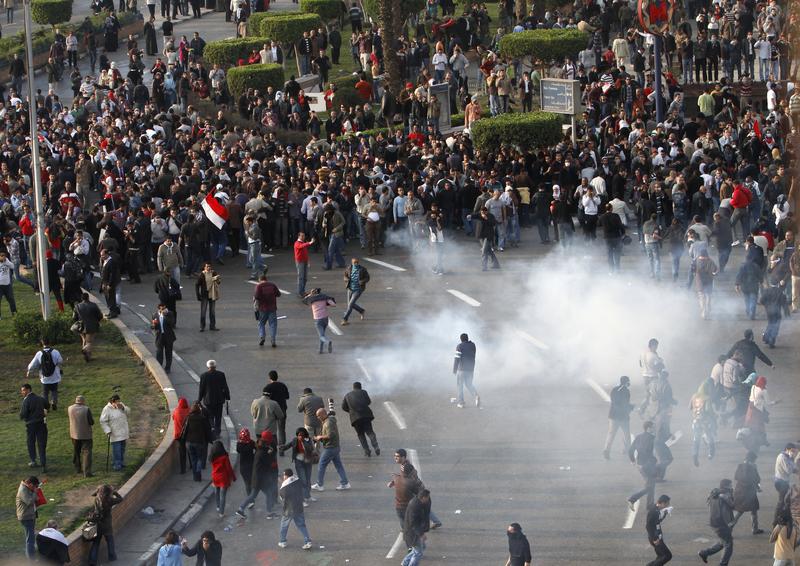
Welcome to Politics Bites, where every afternoon at It's A Free Country, we bring you the unmissable quotes from the morning's political conversations on WNYC. Today on The Brian Lehrer Show, Steven Cook, Hasib J. Sabbagh senior fellow for Middle Eastern Studies at the Council on Foreign Relations, and Blake Hounshell, the managing editor of Foreign Policy discuss the most recent news from the protests in Egypt.
On Friday, Egypt’s military was deployed for the first time since protesters took to the streets four days ago. Reports are coming in that show parts of the ruling party headquarters in flames, and the streets are full of protesters calling for the ouster of Egyptian President Hosni Mubarak. Thousands of protesters have chased police from Tahrir Square in Cairo and there have been accounts of police stripping off their badges and joining the protesters, to great cheers from the crowd. Though protesters had been kept out of the square most of the day, following the confrontation, they were allowed access and thousands flooded in.
Blake Hounshell watched the events unfold on Al Jazeera through the morning.
I’m just stunned at what is going on. The United States seems like it really has lost the plot and is behind the curve on this.
Steve Cook was in Cairo earlier this week, but still finds the intensity of the escalation surprisng.
Even having been on the ground there this week and having been in Tahrir square Tuesday night with the protesters, it was hard to imagine that the situation would spiral like it has now. I think the scale of what is happening today dwarfs what has happened over the course of the last two days, in particular Tuesday, the first day of this. We are watching the Mubarak regime spiral out of control; it is now up to the military and the officer corps to regain control right now. What happens after that, however, should they be able to do it, is going to be an extraordinary moment in the Middle East. It was one thing for [Tunisian dictator] Ben Ali to go, [he was] not all that influential. But if these people succeed in pushing Mubarak from power, it will rock the Middle East.
Who will take power next is the big question, said Cook.
It is more than likely that the military establishment is going to step in here and prevent this situation from becoming complete chaos, or more chaotic than it is now. They have often warned against threats to social cohesion and this is exactly what they’re talking about. And there’s precedent for it, they did it in 1977 and once again in 1986. So the expectation is that as the night wears ion in Cairo, you’ll probably see greater deployments of actual military force and the republican guard. Whether they have struck a deal with Mubarak to save the regime at his expense is anybody’s guess at the moment, but this is really unprecedented in size and scale.
Hounshell said that although President Obama was urging both sides to refrain from violence on Friday, Vice President Biden, by saying that Mubarak is not a dictator, strained credulity to the breaking point.
Seems like not everyone is on the talking points. President Obama really needs to not just say something...he really needs to condemn the violence being perpetrated by the Egyptian government, because every Arab in the world is watching what is going on on Al Jazeera right now, and there are going to be enormous consequences if the United States is not being seen as on the right side of history here.
Cook could not agree more.
There was very little that people in Egypt cared about the last few days other than ousting Mubarak, the United States didn’t factor into it. It was about Mubarak and about freedom… It’s critical for the United States to say the right thing here and thus far, it hasn’t done it.
Hounshell thinks it is possible that the reports of the police stripping off their uniforms to join protesters might be an indication of the military supporting the protesters over the administration, as happened in Tunisia.
We have to assume a basic level of humanity among these people who are being ordered to crack down on their fellow citizens, but I would caution that the Egyptian military has a lot more skin in the current regime than the Tunisian military did. The Egyptian military, and people associated with the Egyptian military, have vast interest in the economy and the current ruling order, so they have a lot more to protect.
Hounshell discussed the footage of protesters stopping and kneeling even as gunfire is heard around them.
It is incredibly moving. I think it’s something that the Egyptian regime is going to have a hard time cracking down on. The image of shooting peaceful protesters praying in the streets... The effect of that would be unfathomable across the Arab world and I don’t think the regime — they’re pretty stupid, but I don’t think they’re stupid enough to do that.
Cook said while he was glad that Secretary of State Hillary Clinton spoke about Egypt on Friday, a statement from President Obama himself would send a stronger message.
The President of the United States [should] stand up and say this is unacceptable. This will have a massive impact on U.S./Egyptian relations should President Mubarak happen to hang on, that shooting protesters in the streets who are doing nothing but demanding freedom and democratic change runs against every value that we as Americans hold dear. We’ve been playing around with this regime for far too many years and their protestation about reform while at the same time they were closing down the political space. It’s now time for the United States to make a fresh break.